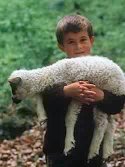- Sheep is the common name for a collection
of grazing mammals that may be wild or domesticated; the domesticated
varieties are the most widely distributed kind of domestic animal,
found in nearly all countries.
|
 |
- Wild species are found in some areas
of the world: the mouflon in Mediterranean countries; the Asian
mouflon in western Asia; the bighorn in western North America;
Dall sheep in northern Canada and Alaska; the urial in Afghanistan
and Pakistan; and the argali in eastern Asia.
|
- The mouflon, a wild sheep, is native
to the Mediterranean islands of Corsica, Sardinia, and Cyprus,
although it has been introduced to a number of other European
countries.
|
- The bighorn sheep is often found in
rugged areas with high cliffs. The average lifespan is believed
to be approximately 9 years; however, some animals have lived
as long as 24 years.
|
- The bighorn sheep (Ovis canadensis)
lives in south-western Canada, the western United States, and
northern Mexico in habitats ranging from dry deserts to alpine
regions.
|
- Related to the musk ox and mountain
goat, Dall sheep, sometimes called the thinhorn sheep, inhabits
cliff regions in Alpine and Arctic tundra areas of Alaska and
the Yukon Territory.
|
- They are large and muscular, and have
fine wool all over the body, head, and legs. The animal shown
here has been part-shorn to show the thickness of its wool.
|
- The coat of Dall sheep varies from
white to black or grey depending on the subspecies.
|
- The horns of the male can curl to an
almost full circle, distinguishing them from the female. They
communicate with goat-like bleats, but also give hissing alarm
whistles.
|
- The fine, soft wool of Rambouillet
sheep make them among the most important breeds of sheep in the
wool industry.
|
- These sheep were originally bred from
Spanish merinos on the French farm of Rambouillet, near Paris.
|
- Sheep were probably domesticated about
11,000 years ago in what is now northern Iraq, and they were
thought to be descended primarily from the Mediterranean mouflon,
but recent evidence suggests that species such as the Asian mouflon
contributed to some of the modern breeds.
|
 |
 |





